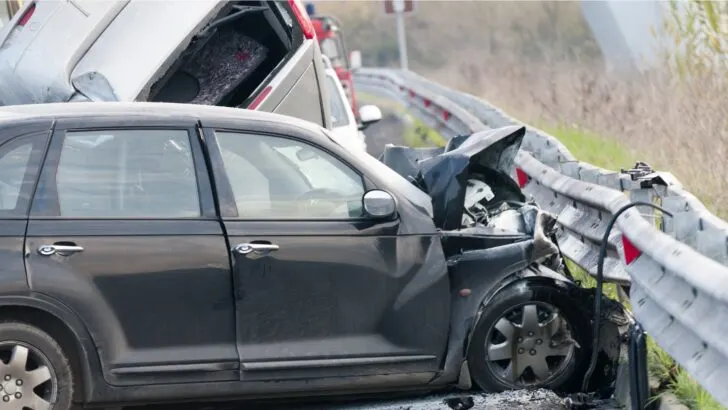RVers can be at risk of highway hypnosis because of the temptation to drive especially long distances. It can be a particular danger for weekenders who are eager to maximize their vacation time by getting to their destination as soon as possible.
It can also be a risk/temptation for those of us with very large fuel tanks. That added fuel capacity can equal very long “legs” without having to stop. (Our 150-gallon tank provides a 1,000-mile-plus range.)
As a former professional motorcoach operator and driving instructor, I spent many years driving long distances, usually on a schedule and at odd hours. Most critically, I had the lives of 50 or more people in my hands. They placed their trust in me to get them safely to their destination.
But highway hypnosis is a risk for all drivers, especially those who drive for long periods of time.
But what exactly is highway hypnosis? And how is it different from simple drowsy driving?
More importantly, how can we avoid it?
We’ll be brief, but we feel this is an important topic for an RV blog to cover, so let’s get right to it.
What Is Highway Hypnosis?
The term “highway hypnosis” is used to describe a situation that leaves a driver in a somewhat trance-like state. This is different from drowsy driving or driving while you’re getting sleepy.
Highway hypnosis, sometimes referred to as “white line fever” is literally an altered mental state based on something called “automaticity.” That’s when we do something we’ve done over and over and over again (in this case driving) automatically, but our mental attention is actually focused on other things.
In other words, while your mind is elsewhere, you’re automatically doing everything you need to do to drive a car, truck, or RV down the highway.
Wikipedia offers a more thorough definition, but suffice it to say that in a state of highway hypnosis, you can drive very long distances and not even be able to remember doing so because you drove with automaticity while your mind was focused on something other than driving.
Ironically, it’s the fact that we’ve driven so many times, and are so used to doing it, that most of the job requires little overt attention… at least when things are going smoothly.
But what about when something unexpected happens — an animal runs in front of you; another vehicle fails to see you and cuts you off; or your vehicle experiences a tire blow-out? Defensive driving requires attention, not complacency.
Why Is Highway Hypnosis Dangerous?
Highway hypnosis is dangerous because it’s an altered mental state that literally takes your focus off of driving and places it on something else.
A person can drive safely for many miles and an extended period of time in this state. However, when an unexpected event calls for you to respond immediately, your reaction time is lowered to a dangerous level.
In a state of highway hypnosis, there’s a significant lapse in concentration. It can leave the driver of a motor vehicle zoned out and not fully present.

Highway hypnosis causes a dangerous reduction in reaction time and a loss of concentration. That can lead to a driver drifting out of their lane, or unprepared to act quickly in the event of an unexpected threat.
In addition to driver reaction times being reduced, the potential for accidents is higher because the brain isn’t communicating all it needs to as a defensive driver. Instead, the mind is focused elsewhere.
And finally, a driver experiencing highway hypnosis is at increased risk of falling asleep at the wheel.
What Causes Highway Hypnosis?
The process of automaticity is what causes highway hypnosis.
Where driving is concerned, the process of automaticity means that we’ve become so accustomed to driving and we’ve done it so much that we can do it (for the most part) without actively thinking about the driving process. In a sense, it’s similar to being on autopilot.
If you’re simply staring straight ahead, zoning out, mind wandering as you drive along the highway, you’re not fully concentrating on the driving process. You’re in an “automatic” hypnotized state, rather than being an active and engaged defensive driver.
What Are the Signs/Symptoms?
There are a number of different signs of highway hypnosis.
- Slow reaction time
- Lack of concentration
- Glassy eyes
- A feeling of being dazed or in a trance
- Wandering thoughts
- Drifting into the next lane or to the side of the road
- Finding yourself suddenly refocusing as though you’re coming out of a trance-like state
- Missing turns, exits, or other traffic guidance

Maintaining good posture, moving our eyes, and talking with our passenger(s) can be helpful in avoiding highway hypnosis.
How to Prevent Highway Hypnosis
There are several techniques a driver can use to help avoid highway hypnosis.
- Maintain good posture while driving.
- Plan to take breaks by mapping out rest areas or other places where you can safely stop.
- Use your breaks to get fresh air, or wash your face with cool water at a rest stop.
- Keep your eyes moving actively to monitor your surroundings and maintain alertness and focus.
- Read road signs and talk with your passenger(s).
- Keep the temperature in the vehicle cool and open windows or vents to allow fresh air.
- Avoid driving during the hours when you typically sleep if possible.
- When possible, try to limit the overall distance you drive in a single day.
- Listen to a podcast or music (the louder and more energetic the better… and don’t be shy about singing along!)
- Chew gum, or snack on foods that are safe to eat while driving (M&Ms anyone?)
- Maybe most of all — Be self-aware! When you’re feeling tired or distracted, stop for a safety break!
- Main Function: Anti-fatigue alarm device.
- Alarm Mode: Sound alert with On and Off button
Have You Ever Experienced Highway Hypnosis?
If you’ve ever experienced highway hypnosis, how did you notice the problem and what did you do to deal with it?
What actions do you take as a driver to avoid a state of highway hypnosis on long trips?
Free RVing Tips, Tricks, Reviews, Giveaways & More
Subscribe to our daily newsletter! We’ve been full-time RVers for 20 years (!) and share everything we’ve learned about RVing in our daily blog posts. Join our online community to receive a wealth of great RVing knowledge delivered right to your inbox.
Whether this is your first time on the road or you’re a seasoned full-timer, you’ll love the wide range of RVing topics we cover. Don’t miss a single article or any of our famous RV gear Giveaways — Subscribe today!



Chazman
Monday 27th of March 2023
My "go to" if I start to feel a little drowsy, but can't stop immediately, is Fireballs. (The candy, not the liquor) Pop a fireball in your mouth and it should be good for 20 minutes to half an hour. At least that's what I get from one.
John S.
Monday 13th of February 2023
Good article. Thanks for researching, writing and posting it.
Larry Lee
Monday 13th of February 2023
We now stop at almost every rest area to walk around. Also have found the 230 rule to be fairly accurate (230 miles or 2:30 PM) to avoid driving at risk and being fatigued the next day. My biggest help in avoiding being hypnotized by the road is talking with my favorite passenger in the co-pilot seat.
Ralph
Monday 13th of February 2023
I have a problem after I eat a carb loaded meal. We bought a ice crusher to give me soft ice to chew. My dentist doesn't yell at me so much and I don't eat so many calories. We have been full timing for 24 years now and I use all the other suggestions. Especially shorter trips now that we are older. Take care and be safe out there.
TheRVgeeks
Monday 13th of February 2023
Thanks for adding your experience, Ralph! You stay safe out there, too!